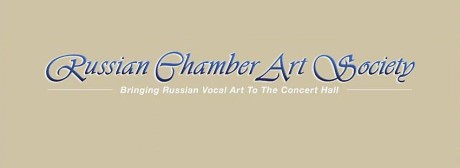The musical imagery of the material presented by Washington’s Russian Chamber Art Society is so distinctive that its substantial audiences actually crave the work that goes into listening to it as well as performing it. Presenters of more conventional or familiar “classical” music who have to deal with distracted, somnolent or simply missing audiences should head over to this unique institution and see how it’s done. Who says you can’t get lots of people to listen to things they’ve never heard before, and love doing it?
In the RCAS’s concert last Friday evening at the Austrian Embassy, three deeply engaged opera singers – all Americans, but one of them a native of Bosnia and one a native of Kazakhstan, with one native-born American – performed 20th century Russian works based on lyrics from the “Silver Age” of Russian poetry. The lyrics for the evening were suffused in color references linked to moods, emotions, nature and faith.
At times the lyrics were loosely tied to historical and political developments, and at other times they weren’t. Or perhaps you had to use your imagination the way Russians did in this early 20th century era and draw your own conclusions about possible lyrical connections to society, revolution, oppression and the search for the common good.
All of the works were sung in Russian. It’s a language with a sound that doesn’t easily “translate” its distinctive feelings and rhythm to English, and thus is rarely actually sung in translation. Because the meanings of the words ranged from mesmerizing to intriguing to inscrutable, the singers’ introductory comments were as important as the written English translations handed out to the audience. You could then choose whether to read along in the English or simply experience the performance and read the detailed lyrics later (I chose the latter).
The keynote for the evening was Russia Cast Adrift, a major song cycle of 12 selections by Georgy Sviridov, who lived from 1915 to 1998. The poems themselves are by a Russian poet who committed suicide – supposedly – at age 30 in 1925 after becoming disillusioned by the Bolshevik revolution. But what works about the cycle is the way that the notion of a nation or a people being “cast adrift” slides in and out of literal and figurative associations.
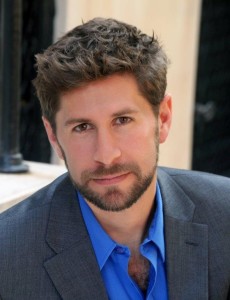
Performing the cycle was baritone Kevin Wetzel, who is busy with opera work nationwide and elsewhere, no doubt for his strong and straightforwardly pleasing voice and clearly effective stage manner. Wetzel’s voice lacks any “tics” or potentially controversial distinctions, and his virtually flawless technique includes a nice, clean reach up to the high range without the sensation of knocking over small objects.
It was a great match for Sviridov’s music, which benefits from the fact that he is said to have had an early “Romantic” style which would have been possible in Russia in the 1930s and 1940s in a way it probably would not have been, indeed frowned upon, in Western Europe. The lines of Sviridov’s later, mature works like Russia Cast Adrift (composed in 1987) are certainly challenging and contemporary-sounding. But they really do match the angular and occasionally eye-raising or even obtuse lyrics from the 12 poems, one of which compares the star alignments in the Milky Way to various species of trees, hot steaming milk, and implements such as nets (if you can put that all together in your head).
The last song ends with the singer bringing the sun in his arms “like a sheaf of oats,” a specific harvest reference which may be rooted in the hopes of the poet from the dark days in Russia in the 1920s and the similar hopes of the composer at the time of liberalization in the late 1980s. Mr. Wetzel had sung earlier in the fourth song of the 12 – the title song of the set – to the Russian equivalent of “Is that you crying in the heavens, Russia cast adrift?” Thus he made the most with his strong baritone of the final, optimistic-sounding image as almost a rejoinder to the earlier question, but an answer suffused with ongoing effort and struggle.
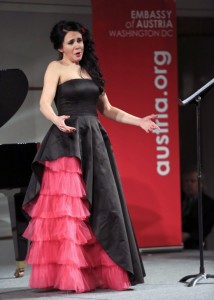
The highlight of the rest of the program was the opening set, consisting of Five Poems of Anna Akhmatova set to music in 1916 by Sergei Prokofiev and sung by Bosnian-American soprano Jasmina Halimic. Prokofiev gave the soprano some spicy notes to sing – several times finishing off a poem at an interesting, not-quite-resolved musical station – but the overall feel of the music is open and limpid without the crushing percussiveness that Prokofiev could sometimes bring to bear.
Ms. Halimic reveled in these musical byways, matching some very concrete imagery by the poet about grass, sunlight and breezes, along with prosaic references to indoor daily life like windows, tables and dust, to her vocal production. The poems do eventually reference both romantic and parental love, to which Ms. Halimic gave true feeling.
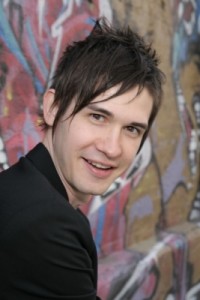
Rounding out the evening were a number of songs by two other Russian composers sung by Kazakh-American tenor Timur Bekbosunov, whose voice has a striking ability to maintain similar volumes all up and down multiple octaves. Mr. Bekbosunov’s bio is jammed with contemporary opera, pop and experimental projects (many of them in the Los Angeles area) and he’s a good pick for almost any kind of adventurous music, as well as apparently being something of a stand-up comic.
Let’s hope Mr. Bekbosunov gets to do more work with the distinctive Russian Chamber Art Society here in Washington in the future. Based on what all three singers said in their remarks about being fired up for the work of the evening by RCAS Artistic Director Vera Danchenko-Stern, who accompanied all of them on the piano, she can be very persuasive about getting the talent she needs to keep the RCAS at the top of its game in service of its unique mission.
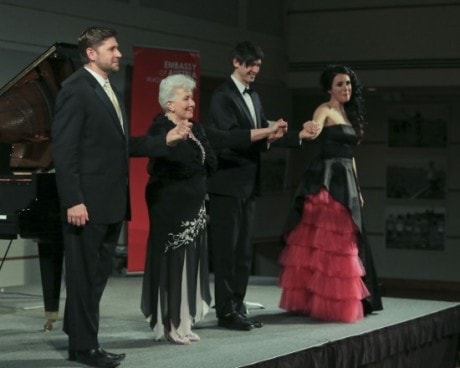
The Silver Age in Russian Poetry in Music was presented by the Russian Chamber Art Society on Friday, February 26, 2016 at the Austrian Embassy – 3524 International Court NW, in Washington, DC.
The next RCAS event is Tender tears and love and life: Songs by Anton Rubinstein, Anton Arensky, Alexander Glazunov, and Mark Minkov on Friday, April 29, 2016. Purchase your tickets online.
For a complete schedule and other information on the Russian Chamber Art Society, see their website.


